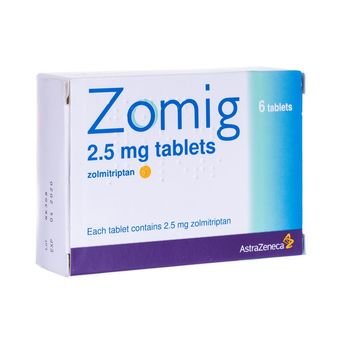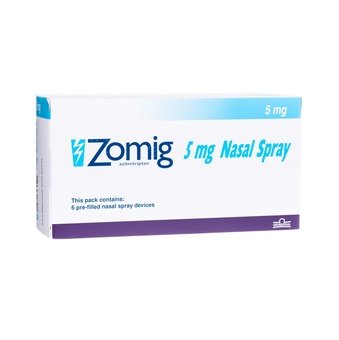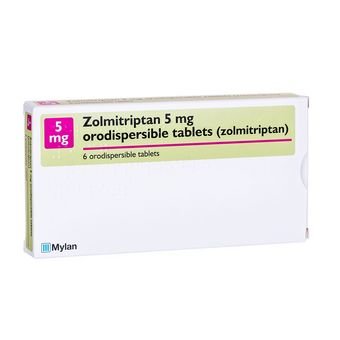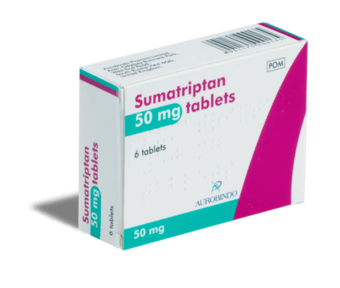What Is Sumatriptan: Benefits, Uses, Side Effects
Migraines have the ability to bring everything to a stop. Luckily, Sumatriptan is here to help. Let's take a deeper look at what Sumatriptan is and how it can help.
Migraines are not just a bad headache, they are a common neurological condition that can cause debilitating symptoms, which can negatively impact an individual's quality of life. While it is not known what exactly causes migraines to occur, there is a very safe and effective class of drugs that have been specifically developed to treat them and their associated symptoms.
This group of medications is called “triptans’ with the first drug developed called Sumatriptan. Sumatriptan is very effective at treating migraines and cluster headaches.
In the article below, we’ll explore what Sumatriptan is, its uses, side effects, where you can buy Sumatriptan tablets and more.
What is Sumatriptan, and what is it used for?
Sumatriptan is a prescription-only medication that is a member of a class of drugs called “triptans”. It is a generic version of the branded alternatives Migraitan, Imigrian, and Boots Migraine Relief.
Sumatriptan was the first 5-HT (1B/1D) agonist developed for the treatment of acute migraine, with the development of other triptans (e.g., zolmitriptan, almotriptan, naratriptan, and others) following. The newer triptans all target 5-HT (1B/1D) receptors like sumatriptan; however, they have been developed with improved pharmacokinetics and bioavailability.
This medication is used to treat acute migraine attacks and cluster headaches. It is typically prescribed when over-the-counter painkillers or non-steroidal anti-inflammatory drugs (NSAIDs) have not been effective.
Sumatriptan can also be used to alleviate symptoms of light sensitivity, headache, nausea, and functional disability (all associated with a migraine attack). Sumatriptan is also used off-label for the treatment of migraines in children and teenagers and for the management of cyclic vomiting syndrome (a rare disease that begins in childhood). Please note that Sumatriptan should only ever be used as prescribed by your GP.
How does Sumatriptan work?
Serotonin, also called 5-hydroxytryptamine (5-HT), plays an essential role in the process that causes migraines. Individuals with migraines often have abnormal serotonin metabolism. Antimigraine drugs such as triptans all share the ability to activate 5-HT receptors.
The headache stage of a migraine attack is believed to result from one or a combination of the following:
- Excessive dilation of the arteries that carry blood up from the heart to the base of the skull (extracerebral cranial arteries)
- The presence of arteriovenous shunts (abnormal connections between a compartment of the venous side of the heart and the coronary arteries)
- Neurogenic dural plasma extravasation (neurogenic inflammation)
Sumatriptan is a selective agonist of 5-HT1 receptors. This antagonism leads to the constriction (narrowing) of cranial (brain) blood vessels and stops the release of pro-inflammatory neuropeptides that cause neurogenic inflammation. Sumatriptan increases blood flow in the middle cerebral and internal carotid arteries while decreasing carotid aerial blood flow. Sumatriptan blocks the release of chemicals that cause pain and other symptoms.
Based on clinical studies, Sumatriptan tablets are generally well tolerated and effective in the treatment of acute migraines and cluster headaches.
Sumatriptan dosage: how to take it?
Sumatriptan is available as:
- 50mg and 100mg tablets
- 10mg or 20mg nasal spray
- 3mg or 6mg pre-filled syringes
The typical dose of sumatriptan for migraine is a single 50mg tablet. Some people may require a single 100mg tablet to provide relief. The maximum recommended dosage of sumatriptan in a 24-hour period is 300mg. This can either be broken into three 100mg tablets taken 2 hours apart or six 50mg tablets taken two hours apart.
Always follow your GP or pharmacist's instructions when taking this medication.
How to take Sumatriptan
If you have been prescribed sumatriptan, take the first dose as soon as migraine symptoms or pain starts. It is important not to take the tablets in the warning stage before the main stage of a migraine attack.
- Tablets: Swallow the tablet whole with a glass of water. Do not crush or chew that tablet. The tablets should begin to work in 30 to 60 minutes. If the first dose of Sumatriptan does not work, do not take another dose for the same migraine attack. You can take another dose in 2 hours' time.
If you struggle to swallow whole tablets, talk to your GP or pharmacist about alternative options of sumatriptan.
- Nasal spray: Each spray of the sumatriptan nasal spray contains 1 dose of either 10mg or 20mg. The nasal spray generally begins to work within 15 minutes. To take a dose of nasal spray, blow your nose if blocked, then place a finger over one nostril. Spray one dose of Sumatriptan into the unblocked nostril, gently breathing in at the same time.
If the migraine does not improve, do not take another dose for the same attack. If the migraine improves but comes back, another dose of Sumatriptan can be taken two hours after the first dose. Do not take more than 2 doses of nasal spray in 24 hours.
- Injections: Administer 1 dose of the pre-filled syringe; it is normally injected into the thigh. Sumatriptan injections typically take 10 to 15 minutes to start working. If the migraine improves but then reoccurs, another dose can be injected an hour after the first dose. If the first dose does not work, do not have another dose for the same migraine attack.
Ensure that you check and follow the instructions provided with the pre-filled syringes. Do not take more than 2 injections in a 24-hour period.
An over-administration or overdose of Sumatriptan in a 24-hour period can make you very sick, as it narrows the blood vessels, causing heart problems such as a heart attack, chest pains, or abnormal heart rhythm. Too much Sumatriptan can also restrict or reduce blood supply to other organs in the body.
If you have taken too much, Call 111 to ask for advice or seek emergency care immediately.
Possible side effects and precautions
Like all medications, Sumatriptan can cause side effects, although not everyone may experience them. Most people may experience mild side effects. However, if they persist, talk to your GP or pharmacist about how to manage them or if an alternative medication would work better for you.
Common side effects of Sumatriptan
Approximately 1 in 100 people are reported to experience mild side effects. Some side effects of Sumatriptan are similar to the symptoms that people experience during a migraine or cluster headache. Common side effects of Sumatriptan include:
- Hot flushes
- Dizziness
- Feeling weak
- Shortness of breath
- Feeling warm or cold
- Nausea or vomiting
- Drowsiness
- Tiredness
- Nose bleeds after using the nasal spray
- Burning or irritation in your throat or nose after using the nasal spray
- Unpleasant taste in the mouth after using the nasal spray
- Swelling or bruising where the injection was administered
Serious side effects
Serious side effects are rare when taking sumatriptan. If you experience any serious side effects, call your GP or 111 immediately. Serious side effects of Sumatriptan may include:
- Unusual feelings of heaviness in the chest, arms, or legs
- Heart attack or other heart problems
- Tingling or tightness in the legs, arms, chest, or face
- Feelings of cold or warmth in the legs, chest, arms, or face
Sumatriptan contraindications: who can’t take Sumatriptan?
For most people, sumatriptan is considered to be an extremely effective and safe migraine medication. However, certain health conditions are contraindicated with this medication, meaning that there is an increased risk to these populations of having negative effects if they take sumatriptan. Thus, they should not take sumatriptan.
Contraindications to Sumatriptan use include:
- Patients with peripheral vascular disease such as cerebrovascular syndromes or ischemic bowel disease
- Patients with basilar or hemiplegic migraine
- Those with a history of stroke
- Patients with high blood pressure
- If there is a hypersensitivity to the drug or its ingredients
- Sumatriptan should not be used in individuals with Wolff-Parkinson-White syndrome
- Patients with ischemic heart disease, including conditions such as angina pectoris, coronary artery vasospasm and myocardial infarction
- Patients currently taking MAO-A inhibitors or have discontinued taking them in the last 2 weeks
In individuals with severe hepatic impairment
If you are unsure about any pre-existing conditions or medications that you currently take, it is important to seek professional advice from your GP or pharmacist before taking Sumatriptan.
Using Sumatriptan with other medicines
As with many drugs, Sumatriptan can react with other medications, affecting the way it should work. There are 91 drugs that are known to interact with sumatriptan, including:
- 5-HT1 agonists (other triptans): Such as rizatriptan, zolmitriptan, almotriptan, naratriptan, or frovatriptan. These medications are all triptans that work the same as sumatriptan. Mixing these medications can cause very high blood pressure, stroke or heart attack.
- Ergot-containing medications: examples include ergotamine and dihydroergotamine. These medicines affect multiple chemicals and hormones in the body, including the tightening of blood vessels (vasoconstriction). Sumatriptan can also cause high blood pressure and vasoconstriction, increasing the risk of stroke or heart attack.
- MAO-A inhibitors: These medications (e.g. antidepressants) are used to treat a variety of medical conditions and raise serotonin levels in the brain. Using sumatriptan with antidepressants can increase the risk of serotonin syndrome. Serotonin syndrome is a serious condition (although rare) where there is too much serotonin in the brain. Symptoms can be mild or serious, including dangerously high blood pressure, stroke, high fever, or uncontrollable body movements.
- Selective serotonin reuptake inhibitors (SSRIs) or serotonin-norepinephrine inhibitors (SNRIs): These are medications (e.g. antidepressants) that raise serotonin levels in the brain and increase the risk of developing serotonin syndrome.
Sumatriptan can be used safely with medications such as painkillers and anti-sickness treatments such as:
- Asprin
- Ibuprofen
- Paracetamol
- Anti-sickness medication, such as metoclopramide or domperidone
Sumatriptan generally does not have a negative interaction with the contraceptive pill or antibiotics. However, it is important to always tell your doctor and pharmacist about any prescription medication, OTC medications, herbal remedies, or supplements that you are taking.
Benefits of Sumatriptan
The primary benefit of Sumatriptan is its effectiveness in treating the headache stage of a migraine attack, which is often very painful. Sumatriptan is also very effective in alleviating other symptoms, such as nausea, vomiting, sensitivity to sound and sensitivity to light, that often accompany a migraine.
Sumatriptan is advantageous in treating migraines in pregnancy and during lactation as this medication does not share uterine contractile properties with ergotamine. It is not thought to be harmful, although more research is needed. There is also no evidence that sumatriptan affects fertility in women or men.
Sumatriptan is also available in low-cost generics, and there are multiple forms of the medication.
Sumatriptan Alternatives
While Sumatriptan is very effective, it might not be suitable for everyone. Fortunately, there are many other antimigraine medication options available. Cloud Pharmacy offers the following other antimigraine medications:
| Medication | Available in | Effective for | Cost |
| Zomig Nasal Spray | Nasal spray 5mg | Migraine headaches and migraine without aura | From £59.99 |
| Zomig | Tablets 2.5mg | Alleviating symptoms of a migraine attack | From £39.99 |
| Zolmitriptan | Tablets 2.5mg | Acute migraine headaches | From £34.99 |
| Rizatriptan | Tablets 10mg | Migraine headaches and associated symptoms | From £14.99 |
| Almotriptan | Tablets 12.5mg | Migraine headache symptoms | From £13.49 |
| Migraitan | Tablets 50mg | Migraines and associated symptoms in adults | From £7.49 |
| Imigrain | Nasal spray | Symptoms of a migraine attack | From £38.99 |
Conclusion
Sumatriptan is a well-tolerated and effective antimigraine treatment for most people. It works by thinning the blood vessels in the brain (that have been painfully widened), and blocks pain receptors, alleviating the severe throbbing pain associated with migraine headaches.
Cloud Pharmacy stocks Sumatriptan tablets (50mg and 100mg) and a wide range of effective and safe antimigraine medications to ensure that you can get the most effective treatment for your symptoms. With an easy online consultation process (with registered pharmacists), you can get prescription medication discretely delivered to your home to ensure you have effective treatment when you need it most.




















